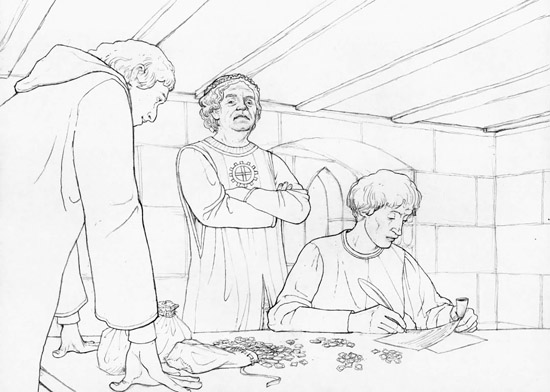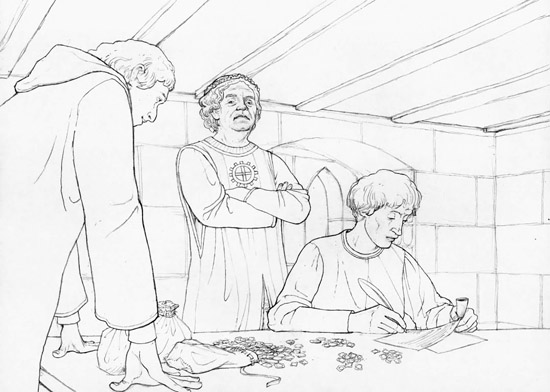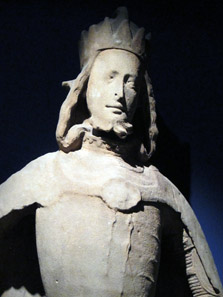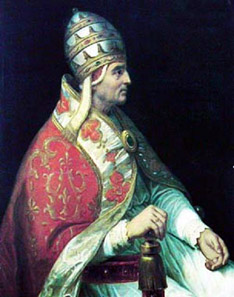The People of Zurich and their Money 4: Robber Barons in Zurich?
by courtesy of the MoneyMuseum Zurich
Our series ‘The People of Zurich and their Money’ takes you along for the ride as we explore the Zurich of times past. The year 1371 saw the pinnacle of a crisis for the aristocracy, which was desperately fighting for its economic and political survival. Much like a good DVD, this conversation comes with a sort of ‘making of’ – a little numismatic-historical backdrop to help underscore and illustrate this conversation.
October 1371. Konrad Biberli who just bought the bailiwick of Eberhard Brun during a forced sale talks to the imperial bailiff Gottfried Mülner. Drawn by Dani Pelagatti / Atelier bunterhund. Copyright MoneyMuseum Zurich.
Bailiff: (ironically) Congratulations. 300 gulden for four bailiwicks, that’s cheap. I hope you are at least conscience-stricken.
Biberli: You won’t believe it, but I have a bad conscience. It is always sad to turn the ruin of a great dynasty to profit.
You are absolutely right. The descent of the Brun hurts.
I have seen it come. Just think of all they had to sell within the last years.
I know: In 1361 the estate of Altstetten, in 1362 the interest of the mill beyond the city-wall, in 1362 the complete mill.
And what did they get for it? 189 gulden only!
Shut up, you bought four bailiwicks and you paid less than double.
You are absolutely right. The price is a shame. The farm at Nöschikon brought more!
I know, 315 gulden. Good God, each year they had to sell a part of their property.
We live in hard times. Since the Habsburgian has let us down, our subjects play old Harry with us. They refuse to pay the tribute! That’s against the God-given world order!
Did you hear what happened to Heinrich of Schönenwerd recently?
No, I didn’t.
A farm hand knocked him with the fist, because he refused to pay the wages before the complete field was mowed.
(perplex) You are kidding.
No kidding.
That is what parvenus mean by law and justice! The victory of violence!
You are absolutely right. Just think of Bruno Brun, the respectable man, and his brother the noble knight Herdegen Brun!
That is really a sad story. They were called robber-barons. They were outlawed and their property was confiscated!
And all that, because Bruno Brun executed his papal mission to make an award in this Lucerne affair.
That was of no interest for the guilds. They saw the possibility to score off the supporters of our Austrian duke. And in the beginning I thought that the case of Eberhard Brun was similar.
No, I couldn’t help it. Too many witnesses had seen that he murdered his cousin.
Isn’t that awful? He dishonored the name of the Brun forever!
Yes, I cannot imagine that any member of the Brun family will be able to play an important part in the council of Zurich in the future.
God heavens Mülner, sometimes I wonder how long all we nobles will play an important part in Zurich. Perhaps something similar will happen to us.
Rudolph IV of Austria. Around 1360/1365. Statue of the south pillar of the Stephansdom (St. Stephen’s Cathedral). Photo: KW.
Making of:
Before his death on September 17, 1360, the nobleman Rudolf Brun, father of the ‘first juror letter’ and a long-time autocrat in Zurich, had entered into the service of the Duke of Habsburg, Rudolph IV. For his service, counsel and help, the mayor of Zurich received a life annuity of 100 gulden a year, as well as a deposit to the Bailiwick of Glarus in the amount of 1,000 gulden, which would have brought him 100 gulden a year in interest. And so it was that Rudolf Brun followed a path that many noblemen had taken before him – he served two masters. One of them was the Austrian duke, to whom he was obligated out of a need to earn money. The duke was trying to concentrate his governing rights in Northern Switzerland, and the Habsburgs’ long-term policy goal was to create a legally and fiscally uniform territorial state. The other ‘master’ was the city of Zurich itself, where Brun lived and worked. Since Zurich’s interests were more or less diametrically opposed to those of the Habsburgs, Brun was faced with a conundrum.
Zurich was intent on gaining greater liberties. The second half of the 14th century saw Habsburg and Zurich engaged in a sort of ‘Cold War,’ and the burden of this conflict was partially carried by the aristocracy. They, like Rudolf Brun and his descendants, found themselves in a quandary between economic necessity and loyalty to their domain and place of work.
When he died, Rudolf Brun left behind four children. For our purposes, two of them are of particular interest: Bruno Brun, the cleric, who among other things, was also provost to Zurich, and his brother, Herdegen Brun, Governor of Thalwil by order of the Austrian duke. Shortly after the death of their father, both brothers ran into some financial difficulties. The sales mentioned in our audio drama are all founded on actual documents. Since their employers, the pope and the Duke of Austria, were both too far away to be able to provide concrete assistance, Zurich city council stepped in. In 1367, at the instruction of council, the treasury stood in as guarantor for both the brothers’ debts. It was an unusual measure, and with it, the city of Zurich effectively assumed the duties of a feudal lord to assure the economic survival of its vassals. On the one hand, city council salvaged the Bruns’ reputation and also forced them both to use their excellent connections and access for the benefit of the city. On the other hand, this payment surely caused somewhat of a stir among the populace – perhaps this loan was the real reason why, on September 13, 1370, the ‘citizens of Zurich, against the will of the mayor and the council’ got into an uproar over the Brun brothers.
Pope Urban V. Source: Wikipedia.
These goings on came hot on the heels of an action that the Zurich guilds had declared to be a breach of peace: Herdegen Brun, along with various accomplices, had captured the Mayor of Lucerne, Petermann von Gundoldingen and his attendant, Johannes, in Au at Wollishofen. The reasons for this detention were likely connected with a mandate issued by Pope Urban V to Bruno Brun, ostensibly to reconcile a dispute between the parish priest of Lucerne and the local diocese. However, the mayor and Zurich council found no cause to take action against the brothers. Left with no recourse, the civic community took matters into their own hands: they assembled in the Großmünster, forced provost Bruno Brun to release the captives and banished the brothers from the city forever. This move didn’t go uncontested however – as a cleric, Bruno Brun appealed to a religious tribunal to justify his position. But the people of Zurich weren’t having it; they knew very well that a papal judge would have come to a very different verdict than theirs. This suspicion was confirmed by the fact that the pope excommunicated Zurich, likely in connection with the circumstances surrounding the Brun incident.
And this brings us to the heart of the problem. For the people of Zurich, it wasn’t specifically about the Lucerne mayor, but rather the enforcement of the monopoly on exercising authority in what they viewed as their territory. Immediately following the Brun controversy, the people of Zurich initiated the Pfaffenbrief (Priests’ Charter), which was also adopted by other Swiss Confederate locales on October 7, 1370. The charter stipulated that the Austrian vassals living within the Swiss Confederacy should offer the oath of allegiance to the confederates. In cases of conflict, this oath was to take precedence over all others. Clerics living within the Confederacy were forbidden from appealing to a foreign court. With this, all political support was wrenched from the aristocracy, who, faced with mounting financial troubles, had entered into the service of foreign feudal lords.
Barely a year later, another member of the Brun lineage, also a retainer to the Habsburgs, was creating quite a stir. This time, it was Eberhard Brun, nephew of Rudolf Brun. It seems that in a dispute with his cousins over inheritance, extreme financial difficulties led him to see no other option than to murder his relatives. The imperial bailiff Gottfried Mülner, who speaks in our audio drama, instructed Zurich city council to launch formal investigations into the matter. Eberhard Brun was found guilty and was banished, and his property was confiscated and then auctioned off. But even here, the issue didn’t go undisputed, and in 1376, an imperial ban hung over the city of Europe in light of the Brun case.
The nationalistically influenced historical narratives of the 19th and first half of the 20th centuries made the Bruns out to be evildoers, and suggested that their particular form of exercising rights was tantamount to an act of violence. In reality, however, they were actually the losers in a struggle for power with the rich Zurich guilds: while there were still six knights and six noblemen with a seat in council in the year 1336, by 1371 this number had been reduced to four and three; by 1375 it was down to three and two and by 1378, stood at just two. As of 1410, no further knights were elected to municipal council.
Incidentally, the story about the berated knight is historical, even if we’ve predated it a bit for the sake of effect. It actually took place in the year 1405. The insulted Heinrich von Schönenwerd brought a charge against the farmer before Zurich council. One would be hard-pressed to find a better example of just how successful the people of Zurich were in bringing the monopoly on exercising authority under their own control.
Two hundred years later, a captain flees and seeks refuge in the Abbess’ chamber – his own soldiers want to kill him for allegedly embezzling their pay. Be sure not to miss this dramatic follow-up episode!
You can find all other parts of the series here.
The texts and graphics come from the brochure of the exhibition of the same name in the MoneyMuseum, Zurich. Excerpts with sound are available as video here.








